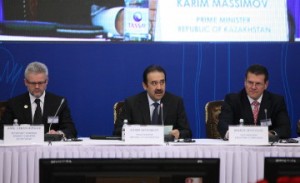 ASTANA – The future of the international energy market and global energy management systems, as well as a review of Kazakhstan’s energy saving and energy efficiency policies, were on the agenda at the 25th Energy Charter Conference, held in Astana’s Rixos hotel on Nov. 26 and 27. Kazakhstan is chairing the conference now.
ASTANA – The future of the international energy market and global energy management systems, as well as a review of Kazakhstan’s energy saving and energy efficiency policies, were on the agenda at the 25th Energy Charter Conference, held in Astana’s Rixos hotel on Nov. 26 and 27. Kazakhstan is chairing the conference now.
Vice President of the European Commission for Energy Union Maroš Šefčovič arrived on his first official visit to Kazakhstan to attend the conference. During the visit, Šefčovič also met with Prime Minister of Kazakhstan Karim Massimov and Minister of Energy Vladimir Shkolnik, who also attended the conference.
Kazakhstan proposed improvements to the Energy Charter process, including introducing a voluntary dispute-resolution mechanism to avoid conflicts in the energy sector at the national level. The country also recommended creating an ombudsman for the protection of investments in the energy sector and the quick resolution of disputes within the Energy Charter Treaty, to be managed under the Energy Charter Secretary General, an official Kazenergy press release on the conference said.
“It is becoming abundantly clear that energy security has become one of the major challenges of our time. Economic growth stimulates the growing demand for energy resources. We believe that this course of action, as well as the search for new and renewable sources of energy, will gain increasing importance in the coming years. Neither companies nor states can solve this problem alone. We must respond to these challenges together. That is why we are taking active steps in order to ensure the active participation of Kazakhstan in all these processes,” Massimov said at the event.
“We believe that the development of efficient energy markets is in our common interest, a common interest to manufacturers, transport and energy consumers. As an important partner for both the East and the West, Kazakhstan, as a bridge, plays an important role in the energy chain. We strive to ensure the diversification of energy supply routes. We are working to develop the CPC [Caspian Pipeline Consortium] pipeline [from Tengiz to Novorossiisk]; we are also expanding pipelines and gas pipelines toward China,” he concluded.
The Energy Charter was signed in 1991. Initially, the organisation was created as a mechanism of energy interaction between Western and Eastern Europe. Over the years, the charter has expanded geographically to include Eurasian countries. Kazakhstan has been a member state of the Energy Charter since 1995.
